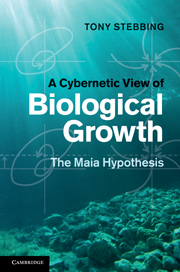Book contents
- Frontmatter
- Contents
- Foreword by Ernest Naylor
- Preface: ‘A fragment of a possible world’
- Acknowledgements
- 1 Introduction
- 2 Growth unlimited: blooms, swarms and plagues
- 3 Self-regulating systems: from machines to humans
- 4 The wealth of homeodynamic responses
- 5 A cybernetic approach to growth analysis
- 6 A control mechanism for Maia
- 7 The three levels of adaptation
- 8 Population growth and its control
- 9 Hierarchy: a controlled harmony
- 10 History of hormesis and links to homeopathy
- 11 Maian mechanisms for hormesis and catch-up growth
- 12 Cellular growth control and cancer
- 13 Human overpopulation
- 14 Our finite Earth
- 15 The Maia hypothesis and anagenesis
- Glossary
- Further reading
- References
- Index
14 - Our finite Earth
Published online by Cambridge University Press: 10 January 2011
- Frontmatter
- Contents
- Foreword by Ernest Naylor
- Preface: ‘A fragment of a possible world’
- Acknowledgements
- 1 Introduction
- 2 Growth unlimited: blooms, swarms and plagues
- 3 Self-regulating systems: from machines to humans
- 4 The wealth of homeodynamic responses
- 5 A cybernetic approach to growth analysis
- 6 A control mechanism for Maia
- 7 The three levels of adaptation
- 8 Population growth and its control
- 9 Hierarchy: a controlled harmony
- 10 History of hormesis and links to homeopathy
- 11 Maian mechanisms for hormesis and catch-up growth
- 12 Cellular growth control and cancer
- 13 Human overpopulation
- 14 Our finite Earth
- 15 The Maia hypothesis and anagenesis
- Glossary
- Further reading
- References
- Index
Summary
God has lent us the earth for our life; it is a great entail. It belongs as much to those who are to come after us … we have no right, by anything that we do or neglect, to involve them in any penalties, or deprive them of benefits which it is in our power to bequeath.
John RuskinWealth is like seawater; the more we drink, the thirstier we become.
A. SchopenhauerWithout a politics of sufficiency there can be neither justice nor peace with nature.
Wolfgang SachsIf we want everything to remain as it is, it will be necessary for everything to change.
Guiseppe Tomasi di LampedusaTHE TRAGEDY OF THE COMMONS
Garrett Hardin (1913–2003) was a controversial American ecologist who spent his career at the University of California in Santa Barbara. His main interest was in human overpopulation. He and his wife were members of the Hemlock Society, which promoted the idea that individuals should be able to choose their own time to die. They ended their lives together in 2003. He is best known for his article entitled The tragedy of the commons, which became one of Science journal's most requested articles. It is an ecological conundrum that occurs when many individuals act independently in their own self-interest; they may ultimately destroy a resource, despite the fact that it is not in anyone's best interest to do so. It was Hardin's belief that the problem had no technical solution, and that only a moral solution could apply.
- Type
- Chapter
- Information
- A Cybernetic View of Biological GrowthThe Maia Hypothesis, pp. 359 - 398Publisher: Cambridge University PressPrint publication year: 2010



